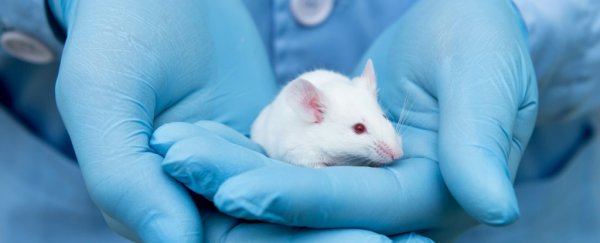A new cancer vaccine involving an immunotherapy drug and a chemical that boosts its efficacy has just shown a 100% success rate in treating melanoma in mice, according to a new study.
In an especially promising development, the researchers were even able to show their new therapy can fight cancer recurrence down the track, which could mean fewer relapses in the future.
"This co-therapy produced a complete response - a curative response - in the treatment of melanoma," says one of the researchers, Dale Boger, from the Scripps Research Institute in California.
"Just as a vaccine can train the body to fight off external pathogens, this vaccine trains the immune system to go after the tumour."
The researchers, from Scripps and the University of Texas Southwestern Medical Center, first screened around 100,000 compounds to look for one that could help them boost the effectiveness of a cancer immunotherapy drug.
Eventually they found a chemical called Diprovocim, which binds to an immune receptor in both humans and mice called Toll-like receptor; the next step was to start testing how this compound could aid the treatment of tumours in mice.
The researchers used a group of mice with an aggressive form of melanoma genetically engineered to contain ovalbumin, a common marker researchers can use to study immune responses in cancer, since it acts as an antigen - it triggers an immune response in the host.
All mice were given a cancer immunotherapy drug called anti-PD-L1, which is meant to prevent tumour cells from evading the host's immune system, and were then split into three groups of eight.
One group got only anti-PD-L1 and an injection of ovalbumin, the latter of which was meant to train their immune systems to recognise the tumour as an intruder.
A second group was given both of these, plus the chemical Diprovocim added to the ovalbumin injection, as a means to stimulate the immune system into action.
The third were also given both the anti-PD-L1 and the ovalbumin, but with the compound alum added instead of Diprovocim; alum also activates the immune system, but in a different way to Diprovocim.
Each animal was given two shots of the cocktail, the second seven days after the first. The injection was also not directly into the tumour, but away from the site - to see if immune cells could help the drugs travel to the tumour.
What the team found was that after the 54 day experiment the first group had a zero percent survival rate, the alum mice had a 25 percent survival rate, and the Diprovocim mice had a stunning 100 percent survival rate.
"It was exciting to see the vaccine working simultaneously with a cancer immunotherapy like anti-PD-L1," says Boger.
The team explains that the vaccine works by stimulating the immune system to make special cancer fighting cells called tumor-infiltrating leukocytes.
And the effects stuck around even after the cancer had gone.
When the researchers tried to re-establish the tumours in these mice, "it wouldn't take," Boger says. "The animal is already vaccinated against it."
This is just a first step in an exciting move forward for cancer immunotherapy, and since the results have so far only been demonstrated in mice with a genetically engineered tumour, we have a while to go until we'll see how this type of cancer vaccine might pan out in humans.
Thankfully, the team is already looking into working with companies to do further testing of this Diprovocium-boosted vaccine, and how it might work in combination with other therapies.
The research has been published in Proceedings of the National Academy of Sciences.
